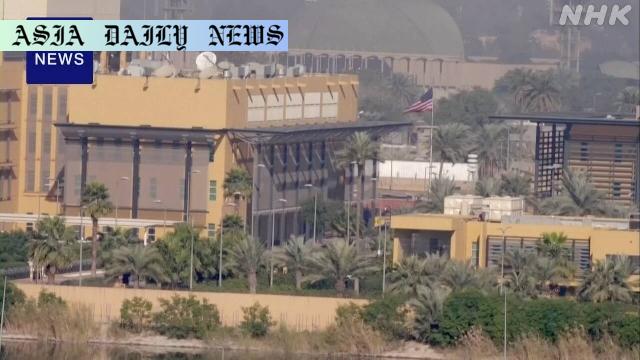Embassy Evacuation: The United States is preparing to evacuate staff from its Iraq embassy due to heightening security concerns.
The US is planning to evacuate embassy staff in Iraq due to increasing regional security concerns.
Defense Secretary Pete Hegseth authorizes the departure of dependents from key Middle East positions.
Tensions escalate as US-Iran negotiations over nuclear programs stall.

US Embassy Evacuation Amid Rising Security Tensions
The United States is undertaking significant measures to secure its diplomatic personnel in Iraq, as the geopolitical landscape of the Middle East grows increasingly volatile. Reports from Reuters indicate that the US government is preparing to evacuate certain embassy staff stationed in Baghdad due to rising security concerns. These precautionary moves follow elevated tensions in the region, particularly related to Iran’s nuclear program and ongoing threats of potential conflict.
Defense Secretary Pete Hegseth has been instrumental in these developments, authorizing the voluntary removal of military dependents from locations across the Middle East. Commenting on the matter, US President Donald Trump emphasized the discretionary nature of the evacuation, stating, “They are being moved out because it could be a dangerous place, and we’ll see what happens.” This statement underscores the looming risks faced by US personnel as the region braces for possible escalations.
Backdrop of the Crisis
The increasing tensions stem largely from deteriorating diplomatic relations between the United States and Iran. At the heart of the disagreement lies Tehran’s nuclear program, with US officials growing skeptical about Iran’s willingness to curtail its uranium enrichment activities. President Trump has previously hinted at the possibility of military intervention should diplomatic efforts falter. Meanwhile, reports of Israel planning to target Iran’s nuclear facilities amplify the precariousness of the situation.
Iran, in turn, has issued strong warnings, stating unequivocally that any attack on its facilities would provoke severe retaliation. In a statement, Iran’s UN mission dismissed US threats of “overwhelming force,” asserting that militaristic approaches only destabilize the region further. Advocating for diplomacy over hostility, Tehran reiterated that it does not seek to develop nuclear weapons.
Economic Impacts of Regional Instability
The geopolitical uncertainty is already manifesting economic repercussions. Following news of the impending embassy staff evacuation, global energy markets reacted sharply. The price of benchmark WTI crude oil futures surged to the mid-68-dollar range, marking the highest level since April. Investors’ reactions highlight the fragility of the global economy in the face of escalating tensions in the Middle East, particularly as these factors threaten to disrupt oil supplies—a lifeline for many industrial economies.
In addition to economic ramifications, the unpredictability of the situation serves as a stark reminder of the complexities involved in resolving long-standing geopolitical conflicts. Both immediate and long-term solutions require meticulous planning, cooperation, and, most importantly, a commitment to peaceful negotiations.
The Path Forward
With hostility mounting, the road to stabilizing relations between the United States and Iran appears fraught with challenges. President Trump’s less optimistic outlook on reaching an accord with Tehran underscores the waning prospects of a fruitful resolution. Nevertheless, pundits argue that diplomatic channels must remain open, with international stakeholders playing an active role in fostering constructive dialogue.
The global community recognizes that enduring peace in the Middle East hinges on a commitment from all parties to de-escalate, negotiate, and prioritize collective security over unilateral decisions. This is a delicate moment that could shape the region’s future, and how nations respond will carry ramifications for years to come.



Commentary
Analyzing the US Embassy Evacuation
The decision to evacuate US embassy staff in Iraq is both precautionary and indicative of rising uncertainty in the region. Historically, such measures serve as a barometer for assessing the intensity of ongoing conflicts or the potential for escalation. Given the volatility surrounding Iran’s nuclear program and strained relations with the United States, it is unsurprising that Washington has opted for prudence in prioritizing the safety of its staff. This move, however, reflects deeper systemic issues at play in Middle Eastern geopolitics.
The Broader Regional Implications
One can hardly overstate the ripple effects of these developments across the Middle East and beyond. With reports of Israel planning to strike Iran’s nuclear facilities, the stakes are higher than ever. Any military skirmish could lead to widespread consequences, including an exacerbation of existing regional conflicts and a potential humanitarian crisis. The prospect of economic instability, underscored by the sharp rise in oil prices, adds another layer of complexity to the unfolding events.
The Role of Diplomacy in Navigating Crises
While preparing for potential contingencies is essential, the importance of dialogue and diplomacy cannot be overstated. History has repeatedly demonstrated that militaristic solutions often yield transient results, failing to address underlying grievances. In this case, the US and its allies must engage with Iran constructively, aiming to rebuild trust and find common ground on key issues like nuclear development and regional security. The international community, particularly the United Nations, could play a pivotal role in facilitating meaningful negotiations.
Conclusion
Ultimately, the current situation highlights the fragility of international relations in volatile regions like the Middle East. The US embassy evacuation may be a logical short-term response to rising threats, but long-term peace and stability require more nuanced approaches. By addressing the root causes of conflict and fostering multilateral cooperation, the global community has the opportunity to prevent further escalation and work toward a more stable future.